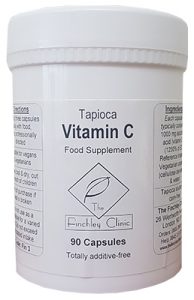It may strike you as a head-scratcher – it certainly does us at The Finchley Clinic – but there are some people out there who still believe that consuming Vitamin C isn’t beneficial to the human body. Frankly, it’s a bizarre and rather laughable idea, given that it flies in the face of practically all credible research on the subject and, well, the simple fact that the body doesn’t produce this hugely necessary vitamin itself. Hugely necessary? Yes, because without enough Vitamin C in your system you could develop the potentially fatal disease of scurvy.
To that end then, what we should be asking ourselves is not whether we need Vitamin C but in what form is it best consumed? Ideally, of course, as is pretty much always the case, this nutrient is surely best consumed via one’s diet. Yet, given that some of us suffer from intolerances to certain foods this can cause problems. Which, naturally, is where Vitamin C supplements come in. And, make no mistake, one of the very best on the market – one which we highly suggest you try giving a go; not just because it’s our best-selling supplement-provider of the vitamin – is Tapioca Vitamin C.
Why Vitamin C’s so important
First, though, a bit of background. Only those of a certain age may be able to recall the time when Vitamin C (or ascorbic acid, as it’s also known) wasn’t quite the household name it is nowadays – basically, it’s been ubiquitous in dietary and nutritional terminology from the early 1970s onwards, when the famous American chemist and peace activist Linus Pauling published his book ‘Vitamin C and the Common Cold’ (which was followed about 30 years later by another highly regarded and important book, Thomas E Levy’s ‘Vitamin C, Infectious Diseases and Toxins: Curing the Incurable’).
From that point on, not only has Vitamin C been an ever-present in the mainstream understanding of human dietary requirements, but the vast majority of the scientific community’s been united on just why it’s so important. And that appreciation for why it’s so important the vitamin’s consumed has grown and evolved. For, today, it’s widely accepted that the vitamin is crucial for:
- detoxifying
- acting as an antioxidant agent
- anti-aging
- collagen building
- immune building
- providing anti-viral properties
- battling general infection
Not all Vitamin C supplements are the same
The UK’s National Health Service (NHS) recommends that adults between the ages of 19 and 64-years-old should consume no less than 40mg of Vitamin C daily; in the US, the recommended daily allowance (RDA) is 60mg a day. However, these dosages really are at the bottom level of the scale – they basically constitute the dosage any person ought to consume to avoid scurvy (which effectively comes about because of grossly deficient Vitamin C intake). The reality then is that all of us should surely consume, on a daily basis, much more of this vitamin.
So, taking that into account, it’s well within your interests to ensure that, should you not be able to rely on your daily diet to get all the Vitamin C you need, you choose the right nutritional supplement to fulfill that need. Now, sure; there’s no end of Vitamin C supplements on the market – be they purchasable in pharmacies, supermarkets, health shops or wherever – but the downside with so many of them is that they tend to be sourced from corn.
And the problem with corn? Many people (up to 65 percent of the population, it’s been estimated) find they’re actually allergenic to this foodstuff – which means that Vitamin C products sourced from it retain corn remnants. Moreover, very often they also contain bioflavonoids, which may trigger intolerance in some people due to these citrus elements’ allergenic nature; plus, it may well be that the level of bioflavonoids (although enough to cause intolerance in some people) isn’t enough to improve Vitamin C absorption – the actual reason why it’s included in the first place.
How Tapioca Vitamin C is different
All of which points to the fact that the best supplement solution for boosting your Vitamin C intake has to be a supplement like the ultra-pure Tapioca Vitamin C. Comprising 1,000mg of the vitamin (99.9 percent of it, in fact), it’s not sourced from corn at all but from the all-natural tapioca – a starchy substance obtained from cassava root – ensuring it’s hypoallergenic, not allergenic.
It also comprises no unnecessary and ineffective chemicals or additives that get in the way of its Vitamin C-absorbance; the Vitamin C it contains being entirely L-ascorbic acid (there are no bioflavonoids or anything here). And both vegetarians and vegans will be pleased to learn that Tapioca Vitamin C is also fully vegan-friendly, so totally suitable for non-meat/ fish/ dairy eaters.
All in all then, you might well conclude it’s not difficult to see why Tapioca Vitamin C has become our best-selling Vitamin C product!

